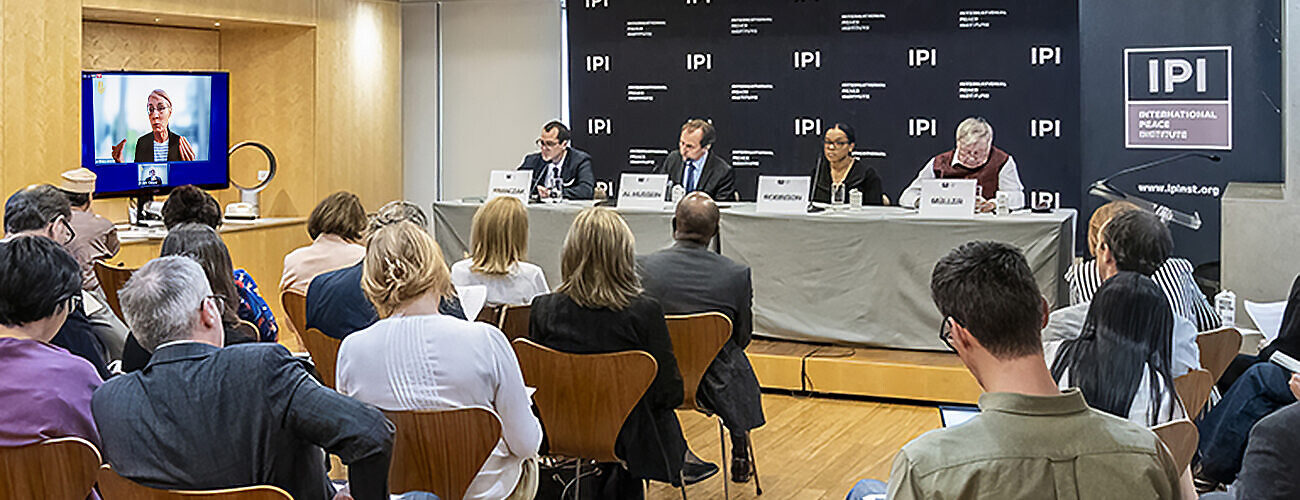The historic decision on loss and damage (L&D) at the 2022 UN Climate Change Conference (COP27) calls for a new fund and funding arrangements focused on addressing L&D. It also tasks a Transitional Committee with preparing recommendations on the new fund and funding arrangements for adoption at the 2023 UN Climate Change Conference (COP28) in Dubai. IPI President Zeid Ra’ad Al Hussein describes this decision made at COP27 in Sharm el-Sheikh as one of the most significant developments since the 2015 Paris Agreement.
IPI together with Oxford Climate Policy cohosted a policy forum on June 30th entitled “Innovative Finance for Loss and Damage: Capitalizing the New Fund.” During the event, participants discussed deficiencies and shortfalls in L&D funding and underscored innovative ways to capitalize on the new fund. Panelists also emphasized the need to take into account the global economic and political context, including the effects of COVID-19 and other crises.
With roughly six months left until COP28, the Transitional Committee will need to work efficiently to achieve its mandate, which includes determining the fund’s financial inputs or sources of capitalization. A new fund for addressing loss and damage will almost certainly require capitalization through a combination of old and new paths. Based on trends in official development assistance, contributions from developed country governments, though important, are unlikely to be sufficient to capitalize a new fund at the scale needed. Thus, it will likely be necessary to include new or “innovative” sources of finance. One idea is to combine conventional (public) contributions from donor countries and contributions from private donors using a specially designed tax, as countries have done with air travel to fund Unitaid. Such a tax could involve levies on air travel, bunker fuel, fossil-fuel extraction, greenhouse-gas emissions, or financial transactions. Another idea is to “frontload” contributions through the issuance of bonds, as the International Finance Facility for Immunisation (IFFIm) has done with its “vaccine bonds.”
Discussants asserted that multiple solutions are needed and presented several innovative options. IPI Research Fellow Michael Franczak noted the failure of developed countries to meet Official Development Assistance (ODA) commitments and introduced the option of a shipping levy. According to World Bank findings, putting a price on carbon could raise 40 to 60 billion dollars from the shipping industry between 2025 and 2050. While 22 countries have declared support for the principle of a levy on carbon emissions, many developing countries have been wary of tax burden transfers. Franczak noted the need for common but differentiated responsibility (CBDR) to effectively operationalize a carbon tax levy.
“The adverse impacts that we are already experiencing are both attributed and associated with changes in global systems,” stated Koko Warner Director of the Global Data Institute, International Organization for Migration. In many cases these impacts are irreversible and deeply challenging for our financial systems, we need to think about flexibility in the real economy. Long recognized as an authority on loss and damage, Managing Director of Oxford Climate Policy and Director of the European Capacity Building Initiative Benito Müller discussed his proposal for international climate solidarity levies and levy on air travel to finance the Loss and Damage Fund. Chris Canavan put forward the idea of using bonds or frontloading to make the Loss and Damage Fund’s financing immediately available. Assistant Professor of Environmental Studies at Colby College Stacy-Ann Robinson affirmed that the conversation about innovative finance for loss and damage is about livelihood: “People matter and we need to center equity and justice.”
The panel contextualized for the New York audience current discussions on innovative finance for L&D, including within the UN Framework Convention on Climate Change (UNFCCC), in Paris at the Summit for a New Global Financial Pact, and at the International Maritime Organization, as well as best practices and examples from existing entities like Unitaid and IFFIm.
Opening Remarks:
Zeid Ra’ad Al Hussein, President and CEO, International Peace Institute
Speakers:
Michael Franczak, Research Fellow, International Peace Institute
Koko Warner, Director, Global Data Institute, International Organization for Migration
Benito Müller, Managing Director of Oxford Climate Policy and Director of the European Capacity Building Initiative
Chris Canavan, Senior Advisor, Cygnum Capital
Stacy-Ann Robinson, Assistant Professor of Environmental Studies, Colby College
Moderator:
Zeid Ra’ad Al-Hussein, President and Chief Executive Officer, International Peace Institute








